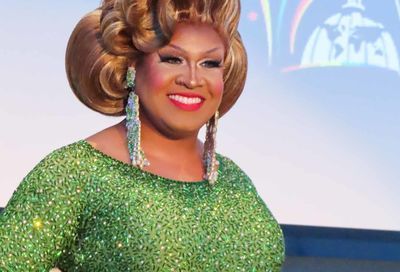Berning Mad: LGBT Sanders supporters on whether they’ll vote for Clinton
We asked LGBT Sanders supporters if they’ll vote for Hillary Clinton in November. Unsurprisingly, responses were mixed.

At the opening night of the Democratic National Convention, Sen. Bernie Sanders delivered a powerful speech on the importance of voting against Donald Trump, pushing his supporters to opt for his former rival Hillary Clinton instead.
“I think it hit the mark in terms of unifying the party and informing us that Hillary backs the same policies and change he, as a political candidate, wanted to see in our democracy,” says Travis Reyes, a 38-year-old teacher from Alexandria. “I admire him for seeing the larger picture and how we must support Hillary to defeat Trump.”
Sanders’ task was far from simple. Reyes, like many others who support the Vermont senator, is incensed at the content of thousands of leaked emails from the Democratic National Committee (DNC) that show staffers badmouthing Sanders and expressing a clear preference for Clinton as the party’s nominee. Their release ripped open a barely-healed rift within the party, confirming what many Sanders’ supporters had believed throughout the hotly-contested primary: that the DNC was “putting its thumb on the scale” for Clinton.
“Remember, the DNC was never to give preference to one candidate over another,” says Reyes. Despite the furor generated by the emails — DNC Chairwoman Debbie Wasserman Schultz resigned because of the backlash — he gives Sanders credit for rising above the fray and supporting Clinton’s presidential ambitions in his keynote speech.
As for Reyes’ own feelings, Clinton is “not [his] first choice,” but is a better option than Trump. He still has misgivings about Clinton’s cozy relationship with Wall Street firms, speeches she gave to Goldman Sachs in exchange for fees of at least $225,000, and a reticence to embrace more liberal elements of Sanders’ economic plans. But Reyes believes Clinton’s heart is “in the right place” when it comes to respecting and embracing diversity, something he does not see in Trump.
“As a Spanish-speaker and a gay guy, I just feel that the Republican nominee is hateful,” he says.
Sanders’ full-throated endorsement of Clinton echoed much of his rhetoric on the campaign trail for the past year. It also attempted to convince some of his most loyal voters to throw their support behind the former Secretary of State — something made harder by the vocal demonstrations continually breaking out on the convention floor.
“Let me be as clear as I can be. This election is not about, and has never been about, Hillary Clinton, or Donald Trump, or Bernie Sanders or any of the other candidates who sought the presidency,” Sanders said. “This election is about which candidate understands the real problems facing this country and has offered real solutions — not just bombast, fear-mongering, name-calling and divisiveness.
“By these measures, any objective observer will conclude that — based on her ideas and her leadership — Hillary Clinton must become the next president of the United States. The choice is not even close.”
In keeping with the theme of Sanders’ speech, Monday night’s convention was all about pushing a message of unity among Democrats as the nation heads into this November’s election. Convincing those who backed Sanders for president is essential to the party’s success. And yet, despite polls suggesting as many as 90-percent will eventually rally behind Clinton, it remains unclear whether a significant portion of Sanders’ supporters will be able to overcome their anti-Clinton animus.
Kat Velkoff, a 27-year-old teacher from Chantilly, Va., is one of those former Sanders supporters who has mixed emotions about what she’ll do in November’s election.
“It is hard for me to imagine that I would not vote for Hillary, but for the first time in my life I feel as though American democracy has let me down,” says Velkoff. “I feel like I will be voting for the lesser of two evils instead of voting for a candidate I can actually believe in.”
Velkoff would never consider voting for Trump, believes Green Party nominee Jill Stein is an anti-vaxxer, and remembers Libertarian nominee Gary Johnson, who also ran in 2012, saying in a debate that year that he believed in legalizing heroin. But even though she’s likely to favor Clinton, she says other Sanders voters will be much less amenable to voting for the former Secretary of State come November.
“She will have no problem convincing lifelong Democrats to vote for her, but I worry about friends who are my age who have never been a part of a political movement before, much less voted in an election or a primary,” says Velkoff. “On the Bernie Facebook pages they have been fed nothing but nasty information about Hillary. They are not typical voters, and, unfortunately, I think they could stay at home on Election Day with the candidates we have.”
Other Democratic voters have completely rejected Clinton, choosing to throw their support behind Stein, who in some economic aspects has positions similar to Sanders.
“Part of the problem I have with Hillary is I find she’s tied to large corporations, Wall Street, Big Oil, she supports fracking, the list goes on,” says Stone Lyons, a 50-year-old video producer from the District of Columbia, who will vote Green in November. “For me, she was never the right candidate to begin with…. She’s changed her stance on a lot of issues. Everybody has a right to change their mind. But it seems like it sort of changes to whomever she’s speaking with at the time.”
Kyle Rohen, a 31-year-old quality control and contracts specialist from Herndon, Va., says the contents of the DNC emails, posted by the online cyber-anarchist website Wikileaks, could be problematic in winning over the last of the Sanders holdouts — even as a majority move in Clinton’s direction.
“There are fewer Bernie-or-Busters at this point in the election cycle than there were PUMAs [voters opposed to President Obama’s candidacy] on Election Day in 2008,” says Rohen. That’s true even given the anger of Sanders’ supporters, which they made evident when they yelled over or catcalled speakers during Monday night’s convention.
“As far as the delegates on the ground in Philadelphia, a lot of them are feeling especially burned because of the weekend email dump,” says Rohen. “If that hadn’t happened, they wouldn’t be quite as up in arms. That isn’t to say there wouldn’t have been some people still complaining at this point, but I think, with the email dump, it just opened up a whole bunch of fresh wounds.”
Rohen is supporting Clinton in November. It took a while for him to come around.
“It’s more of a vote against Trump,” he admits. “I had considered voting for Jill Stein for a while, but she, especially over the last few weeks, has been so erratic in her behavior and some of the things she’s saying, that, in the very unlikely chance that she became president, she wouldn’t be a good fit.
“Hillary, I think, is a good fit,” he continues. “Despite my difference with her on a policy level, I’ve always thought she’d be a very capable president.”
It’s not just Clinton herself that so-called “progressives” take issue with. Her choice of Sen. Tim Kaine, former governor and mayor of Richmond, as vice president has also come under fire. Rohen wishes Clinton had picked someone more progressive, like U.S. Rep. Keith Ellison (D-Minn.), an African-American, one of two Muslim congressmen, and a member of the House Progressive Caucus, who could have shored up her vulnerabilities and provided a contrast to Trump’s nativist campaign. He also would have preferred Labor Secretary Tom Perez. But, like others from Virginia, Rohen is not stridently opposed to Kaine, given his time as governor.
“I think there’s still a huge enthusiasm gap when it comes to progressives and the youth vote,” Rohen says of Clinton’s campaign. “Tim Kaine is okay. I think ideologically speaking, he fits and makes better sense for the Hillary ticket. But as for energizing the youth vote or the progressive vote, I don’t think Tim Kaine would ever be appropriate for that. Choosing him is going to be a wash.”
But Sanders supporter Charles Bright, a 30-year-old executive assistant from Falls Church, Va., defends Clinton’s choice, because Kaine helps the ticket shore up support in Virginia. Most people, particularly Democrats, like Kaine and remember him fondly from his time as governor, particularly when he served as a buffer to the unbridled conservatism of the Republican-dominated General Assembly.
“He may not be as obviously liberal as Elizabeth Warren or Sherrod Brown, but look at where he started his career. He started as an attorney working on fair housing cases for people who were denied housing because of their gender or their race. Look at the work he did on death penalty cases,” says Bright. “His heart has always been in the right place. He’s not perfect, but I trust his leadership. Honestly, him being on the ticket makes me more enthusiastic to vote for Hillary Clinton in November.”
Support Metro Weekly’s Journalism
These are challenging times for news organizations. And yet it’s crucial we stay active and provide vital resources and information to both our local readers and the world. So won’t you please take a moment and consider supporting Metro Weekly with a membership? For as little as $5 a month, you can help ensure Metro Weekly magazine and MetroWeekly.com remain free, viable resources as we provide the best, most diverse, culturally-resonant LGBTQ coverage in both the D.C. region and around the world. Memberships come with exclusive perks and discounts, your own personal digital delivery of each week’s magazine (and an archive), access to our Member's Lounge when it launches this fall, and exclusive members-only items like Metro Weekly Membership Mugs and Tote Bags! Check out all our membership levels here and please join us today!




















You must be logged in to post a comment.